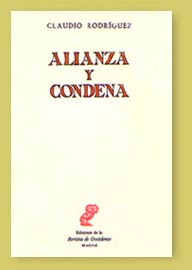Alliance and Condemnation (1965). In this book, the presence of redemptive pain and love that surround the poet shape his conceptual commitment. The poetic voice is always alert and tuned with the life, the people and the landscapes that conform, from the beginning, his poetic adventure.
Alianza y condena, Madrid: Revista de Occidente, 1965, 135 p.FURTHER EDITIONS
- Madrid, Alianza, 1995, 106 p., (El libro de bolsillo. Literatura, 1771).
- Critical edition by Luis García Jambrina, Zamora, Diputación Provincial, Instituto de Estudios Zamoranos, 2001, facsímile edition.
- New edition with foreword by Luis García Jambrina, Palencia, Cálamo, 2009, 109 p., (Cálamo poesía, 4).
- Zamora, Instituto de Estudios Zamoranos Florián de Ocampo, Seminario Permanente Claudio Rodríguez, 2009.
WITCHES AT MIDDAY
(Toward Knowledge)
It’s not old women’s sayings
nor matter of eyeless needles or headless
pins. It doesn’t burst,
like salt in a fire, this simple
spell, this old
curse. It needs either aspergillum
to sprinkle nor candle
of virgin wax. Every
form of life has
a cooking point, a meteor
of bubbles. There, where the lottery
of the senses seeks
property, there, where
being curdles, in that
living stamen, witchcraft
lodges. It is not only the body,
with its legendary maladroitness, that
fools us: in the very
constitution of the matter, in such
clarity that is a trick,
winks, concoctions, tremulous
lipstick, they unhinge us. And it smells
like a black and oily headscarf, like a pure
witch, this September midday,
and in the folds of the air,
on the altars of space, there are interred
vices, places
where youth and sinister recipes for loves
can be bought. And in the taut
unfolding of the day, not lips
but dry gums
such from our blood
prayer and blasphemy,
memory and oblivion,
all that which was calm or fever.
Like someone who reads in a crossed-out line
the repentance of a lifetime,
with tenacity, with pity, with faith, even with hate,
now, at midday, when it is
hot and taste is
faint, we ponder
the deep ruin and the stubborn progress
of things, their eternal
ravings, while the swallows
screech in flight.
The hillside flower, the mature lard,
the child’s navel, the morning
street party of St John’s day, the doll
with one arm, resin,
good for a woman’s hips,
saffron, the lowly thistle, the stew
of Talavera with pepper and wine,
everything of witches, natural
things, today are nothing
next to this coven
of images that, now,
when beings cast little shadow,
gives a reflection: life.
Life is not a reflection,
but, What is its image?
One body above another,
does it feel resurrection or death? How
to poison, to wash
this air that is not our lung?
Why does someone in love never
seek truth, but seeks joy?
How can joy exist
without truth? Here is everything.
But we never
touch the suture,
that stitching (sometimes a mend,
sometimes embroidery),
between our senses and things,
that fine sand
that no longer smells sweet but sharp,
where the river and the sea disembogue,
one echo in another echo, the debris
of a dream in the quicklime
of that dream for which I gave a world
and will go on giving it. Amid the ruins
of the sun trembles
a nest with nocturnal heat. Amid
the ignominy of our laws rises
the retable with old
gold and old doctrine
of the new justice. In that markets
of high swindle is the water
wine, the wine blood, thirst blood?
Through what customs is
flour smuggled
like flesh, flesh
like dust and dust
like future flesh?
This is a fool’s doing. A common
crime this walking amid pinches
of witches. Because they
don’t study but dance
and piss, are locals
on taverns. And now,
at midday,
if they kiss us from so many things,
where will their night be,
where their lips, where our mouths
to accept so many lies and so much
love?
Translated by Luis Ingelmo and Michael Smith, Collected Poems / Poesía Completa 1953-1991. Exeter. Shearsman Books, 2008.
